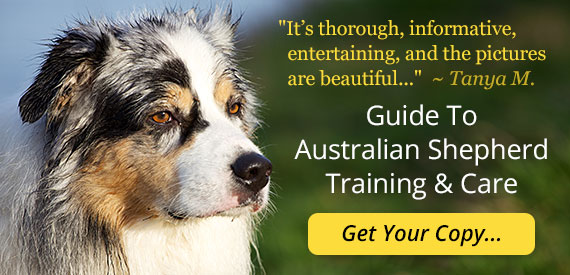Key Takeaways
-
Australian Shepherds are loyal and affectionate, making them excellent companions.
-
They have high energy levels and require significant exercise and mental stimulation.
-
Potential health issues include hip dysplasia, eye disorders, and epilepsy.
-
Adopting through breed rescue groups can offer a loving home to a dog in need.
-
They can be good family dogs but require proper training and socialization.
What are the Pros and Cons of an Australian Shepherd
Australian Shepherds, often referred to as Aussies, are renowned for their intelligence and agility. However, owning one of these dogs comes with both benefits and challenges. Let’s delve into the pros and cons of having an Australian Shepherd.

“Australian Shepherd Rescue” from www.australian-shepherd-lovers.com and used with no modifications.
Loyal and Affectionate Companions
Aussies are known for their loyalty and affectionate nature. They form strong bonds with their families and are protective of their loved ones. This makes them excellent watchdogs and loyal companions.
Besides that, their affectionate demeanor means they often seek out interaction and companionship, which can be very rewarding for their owners.
Potential Health Concerns
Like all breeds, Australian Shepherds can be prone to certain genetic health issues. Common concerns include hip dysplasia, eye disorders, and epilepsy. Regular vet check-ups and a healthy lifestyle can help mitigate some of these risks.
It’s crucial to be aware of these potential health issues and to adopt from reputable breeders or rescue groups who prioritize the health of their dogs.
Energetic and Active Nature
One of the most defining traits of an Australian Shepherd is its high energy level. These dogs require regular exercise to stay happy and healthy. They thrive in environments where they can engage in physical activities and mental stimulation, similar to American Foxhounds.
-
Daily walks and runs
-
Engaging in dog sports like agility or obedience training
-
Interactive toys and puzzles to keep their minds sharp
Without sufficient exercise, Aussies can become bored and develop behavioral issues. Therefore, they are best suited for active individuals or families who can meet their exercise needs.
Adopting Australian Shepherds Through Breed Rescue Groups
Adopting an Australian Shepherd through a breed rescue group can be a rewarding experience. These groups often have dogs of various ages and temperaments, allowing you to find a match that suits your lifestyle.
Benefits of Adopting from Rescue Groups
-
Providing a loving home to a dog in need
-
Often less expensive than buying from a breeder
-
Rescue groups typically provide initial vet care and vaccinations
-
Support and resources from the rescue organization
Adopting from a rescue group not only gives a dog a second chance but also supports the efforts of these organizations in rescuing and rehoming more dogs. For example, consider adopting an American Foxhound from a breed-specific rescue group.
How to Find Reputable Breed Rescue Groups
Finding a reputable breed rescue group is essential to ensure a positive adoption experience. Start by researching organizations that specialize in Australian Shepherds. Look for groups with good reviews and a transparent adoption process.
Most importantly, ensure that the rescue group prioritizes the health and well-being of their dogs. They should conduct necessary health screenings and provide a nurturing environment for the dogs in their care. For more information on the breed, you can visit this Australian Shepherd guide.
-
Search online for Australian Shepherd rescue groups
-
Ask for recommendations from veterinarians or dog trainers
-
Attend local dog events or meetups to connect with rescue organizations
By adopting through a reputable rescue group, you can be confident that you are bringing home a healthy and well-cared-for dog. For more information on the breed, check out this Australian Shepherd guide.
What to Expect When Adopting
Adopting an Australian Shepherd from a rescue group often involves an application process, home visit, and adoption fee. The rescue group will want to ensure that you are a good fit for the dog and that the dog will thrive in your home. Learn more about the process from this American Foxhound breed adoption guide.
Be prepared to provide information about your lifestyle, experience with dogs, and how you plan to care for your new pet. The rescue group may also offer support and resources to help you transition your new dog into your home.
Are Australian Shepherds Good Family Dogs
Suitability for Families with Children
Australian Shepherds can be great family dogs, especially for families with older children. They are affectionate and protective, often forming strong bonds with their human family members. However, due to their herding instincts, they might try to herd younger children, which can include nipping at heels. Proper training and supervision are essential to ensure that these behaviors are managed appropriately. For more information, you can check out this detailed guide on Australian Shepherds.
In general, Aussies thrive in active households where they can participate in family activities. They enjoy playing games, going on hikes, and even participating in sports. Their energetic nature makes them great playmates for children who can match their activity levels.
Australian Shepherds and Other Pets
Australian Shepherds usually get along well with other pets, especially if they are socialized from a young age. They can coexist peacefully with other dogs and even cats. However, their herding instincts might kick in, leading them to try to herd other animals in the household.
Introducing an Aussie to other pets should be done gradually and under supervision. Positive reinforcement techniques can help foster good relationships between the Aussie and other pets. With proper training and socialization, Australian Shepherds can become harmonious members of a multi-pet household.
Are Australian Shepherds High Maintenance
Australian Shepherds do require a fair amount of maintenance, primarily due to their high energy levels and grooming needs. Understanding these requirements is crucial for potential owners.
Grooming Requirements
Aussies have a double coat that requires regular grooming to keep it in good condition. Their fur can mat if not brushed regularly, so it’s essential to brush them at least once a week. During shedding seasons, more frequent brushing may be necessary to manage the extra hair.
Besides brushing, Australian Shepherds also need regular baths, nail trims, and dental care. Keeping their ears clean and checking for any signs of infection is also important. While their grooming needs are not excessively high, they do require consistent attention to keep them looking their best. If you’re considering another breed, you might want to explore the American Staffordshire Terrier.
Exercise and Mental Stimulation Needs
One of the most critical aspects of owning an Australian Shepherd is meeting their exercise and mental stimulation needs. Aussies are incredibly active dogs that require daily physical exercise. This can include long walks, runs, or play sessions. Engaging in dog sports such as agility, obedience, or herding trials can also be a great way to keep them physically and mentally stimulated.
Without adequate exercise, Australian Shepherds can become bored and develop destructive behaviors. Providing them with interactive toys and puzzles can help keep their minds sharp and prevent boredom.
Training and Socialization
Training and socialization are vital for Australian Shepherds. These intelligent dogs thrive on learning new things and need consistent training to keep them well-behaved. Early socialization helps them become well-adjusted adults who are comfortable in various situations and environments.
Positive reinforcement techniques work best with Aussies, as they respond well to rewards and praise. Training sessions should be regular and varied to keep them engaged. Enrolling in puppy classes or working with a professional trainer can be beneficial, especially for first-time Aussie owners.
-
Start socialization early
-
Use positive reinforcement techniques
-
Keep training sessions short and engaging
-
Enroll in puppy classes or work with a professional trainer
Are Australian Shepherds Good House Dogs
Australian Shepherds can make good house dogs if their needs are met. They are loyal and enjoy being part of the family, but they do require space and activities to keep them occupied. If you’re considering other breeds, you might want to look into American Staffordshire Terriers as well.
Housing and Space Needs
Aussies do best in homes with a yard where they can run and play. However, they can adapt to apartment living if they receive sufficient exercise and mental stimulation. It’s important to provide them with a safe space where they can relax and feel secure, similar to how American Foxhounds need their own comfortable environment.
Regardless of the living situation, ensuring that an Aussie gets enough physical activity is crucial. Regular walks, playtime, and mental stimulation are necessary to keep them happy and healthy. For more details, you can check out this comprehensive guide on Australian Shepherds.
Behavior and Proper Housebreaking
Australian Shepherds are generally easy to housebreak due to their intelligence and eagerness to please. Consistent training and a routine can help them learn quickly. Crate training can also be beneficial in housebreaking and providing them with a safe space.
It’s essential to be patient and consistent during the housebreaking process. Using positive reinforcement and rewarding good behavior can encourage them to follow the desired routine. For those considering adopting, check out the American Foxhound breed adoption process to find a suitable pet.
“Consistency is key when housebreaking an Australian Shepherd. Establish a routine and use positive reinforcement to encourage good behavior. For more information on adopting this breed, visit American Foxhound breed adoption.”
Final Thoughts on Australian Shepherds
Owning an Australian Shepherd is a commitment that requires time, effort, and dedication. These dogs are loyal, intelligent, and full of energy, making them excellent companions for the right owners. Ensuring that their physical and mental needs are met is crucial for their well-being. If you’re considering other pets, you might also be interested in learning about the Abyssinian Satin Guinea Pig.
Finding the right fit for your family involves considering your lifestyle and whether you can meet the demands of this active and intelligent breed. With proper care, training, and socialization, an Australian Shepherd can be a loving and loyal addition to your family.
Frequently Asked Questions
What should I know before adopting an Australian Shepherd?
Before adopting an Australian Shepherd, understand that they require a lot of exercise and mental stimulation. They are intelligent and need consistent training and socialization. Additionally, be prepared for regular grooming to keep their coat in good condition. For more information on similar breeds, you can check out the American Staffordshire Terrier breed adoption guide.
How much exercise does an Australian Shepherd need daily?
An Australian Shepherd needs at least one to two hours of exercise daily. This can include walks, runs, playtime, and engaging in dog sports. Mental stimulation is also important to keep them happy and prevent boredom.
Are Australian Shepherds good with other pets?
Yes, Australian Shepherds can get along well with other pets, especially if they are socialized from a young age. Proper introductions and positive reinforcement can help foster good relationships between an Aussie and other animals in the household.
What are common health issues in Australian Shepherds?
Common health issues in Australian Shepherds include hip dysplasia, eye disorders, and epilepsy. Regular vet check-ups and a healthy lifestyle can help manage these risks. Adopting from reputable breeders or rescue groups who prioritize health screenings is also important.


